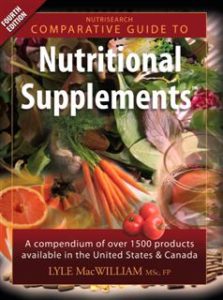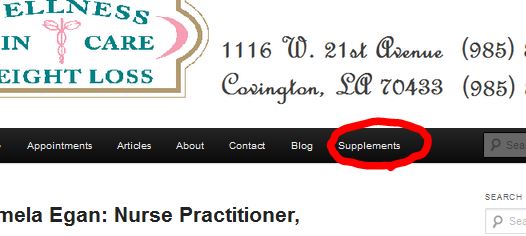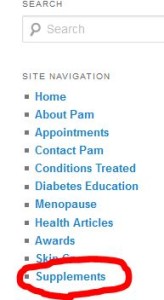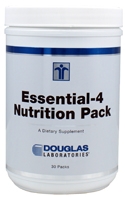Are You Taking the Right Supplements?
By: Peter Egan Jr
I had a discussion with an acquaintance recently who was questioning the legitimacy of vitamins and mineral supplements.
She described how she had been taking vitamins and nutritional supplements and had experienced no noticeable impact.
Vitamins are for real. However, like any other product, not all vitamins are manufactured to the same level of quality.
 There is a comparative guide that serves as a non-official clinical nutrition industry standard as a reference for the relative quality of several hundred of the world’s largest supplement manufacturers. The book is called Comparative Guide to Nutritional Supplements, and it reports on objective scientific research involving the bioavailability and/or absorption rate of each known product from several hundred of the most widely distributed manufacturers of vitamins and nutritional supplements.
There is a comparative guide that serves as a non-official clinical nutrition industry standard as a reference for the relative quality of several hundred of the world’s largest supplement manufacturers. The book is called Comparative Guide to Nutritional Supplements, and it reports on objective scientific research involving the bioavailability and/or absorption rate of each known product from several hundred of the most widely distributed manufacturers of vitamins and nutritional supplements.
A low-quality supplement is poorly absorbed (if at all), and is a complete and total waste of money. According to the CGtNS Fourth Edition, this accounts for the overwhelming majority of products found in places such as grocery stores, pharmacies and even specialty nutrition shops. In the 4th Edition, there were only a handful of manufacturers of the hundreds evaluated whose products scored a 3-star (out of a possible 5) for the majority of their products. Very few had more than 1-in-5 or so meet the 3/5 mark, while the few that scored remarkably better than the rest were nearly 4, 4/5 and 5-star rated across-the-board, with their lowest scoring products almost always better-rated than the overwhelming majority of companies’ best-scoring product.
If you’re serious about optimal nutrition for preservation of good health, disease prevention or whatever other reason, it’s a book you should at least have a look at if not buy (I don’t know the author and have no financial interest in the book’s sales). The reason I’m suggesting it is because I find it to be a remarkably good resource for a topic about which I am passionate and about which I believe that the consequences for poor decision-making are significant enough to merit learning as much as possible.
I didn’t buy it. My mother, a nurse practitioner and clinical nutrition expert, gave it to me as a gift. I have read it more than any other book – fiction or non-fiction – in the time since she passed it along to me.
Point being, and the reason I mention all of this, is that the absence of noticeable results described by the acquaintance could very well be the byproduct of poorly produced supplements or supplements which were improperly stored post-manufacture, decreasing the effectiveness and potency of the products themselves.
The question everyone should be asking mightn’t be “are supplements for real?” Rather, the better question may well be: “am I taking the right supplements?”
My advice is that if you care enough about the bottom line, get the book or ask someone who has it how your brand stacks up against the rest.
I’m not going to plug any particular brand of supplements in this post, but I welcome anyone curious enough to pursue an answer to either get the book or email me and ask me how your brand compares. I’ll be happy to answer in good faith. However I want to be perfectly clear that the reason I am offering is so that nobody mistakes the intention of this post to be the promotion of a book I didn’t write, buy or in any way benefit from its success. On a similar token, I don’t benefit from the promotion of any supplement brand except for my mother’s, which did not exist at the time the book was published.
However, I care about my own health, and I myself take a plethora of vitamins, minerals and supplements. I only buy from those manufacturers whose products are rated 4-stars on-average at the very minimum (according to the CPNS 4th Edition), and I have noticed a monumental difference in terms of my own personal health and productivity in the time since I began regularly taking high-quality vitamins and supplements.
For anyone seeking to purchase medical-grade supplements, just click the “supplements” tab at the top of the page (or the link in this sentence). Dr. Egan only offers the very top brands of supplements in terms of quality. Price is set by the manufacturer, and we are not permitted to sell below the minimum price dictated to us. Point being, you can’t go anywhere else and (at least legitimately) get these same supplements for any less than Dr. Egan charges for them. Some of the brands sold include Designs 4 Health, Metagenics, Douglas Laboratories, Bio-Tech and Neuroscience. Check out her Bonanza storefront as well as the dedicated, complete catalogs of every product made by Designs 4 Health and Metagenics.
We wish we could put all the supplements in one place, but there’s just so many it’s easiest for everyone if we break it down by brand and have a page for each of our two most popular brands as and a storefront carrying the third major brand and all other brands stocked inside the clinic.





 the drug store or over the counter.
the drug store or over the counter.